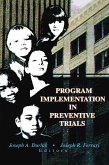First published in 1996, this enlightening book about facilitating therapeutic change within the couple relationship opens with a transcript of one of a series of lectures by Virginia Satir. It presents readers with Satir's observations - observations that show the difference between thinking with systems in mind and thinking linearly - of process, interrelatedness and attitudes. Readers will find these and the observations of contributors that follow full of practical application potential. In this title the editor brings together contributors who show how to affect change in couples by explaining dynamics of the male/female relationship and by expanding upon the roles of the therapist. Specifically, contributors give readers information about:Male/female relationships over a 30, 000-year history and how history may have affected present day relationships between men and womenTherapists as merely resource providers who facilitate self-discovery and self-solutionsThe necessity of marital therapy in maintaining stability and change from both systemic-interpersonal and intrapersonal perspectivesPsychodynamic, affective and insight-oriented, marital therapyThe consultative conversation model and its relationship to the change process in couples therapyFostering change of psychological (emotional and verbal) abuseWhy women leave abusive relationshipsThe use of a specific physical posture for assessing a couple's interactive styleTherapists who work with couples will keep Couples and Change within reach and refer to it often as they help couples develop more healthy, satisfying relationships.
Dieser Download kann aus rechtlichen Gründen nur mit Rechnungsadresse in A, B, BG, CY, CZ, D, DK, EW, E, FIN, F, GR, HR, H, IRL, I, LT, L, LR, M, NL, PL, P, R, S, SLO, SK ausgeliefert werden.









